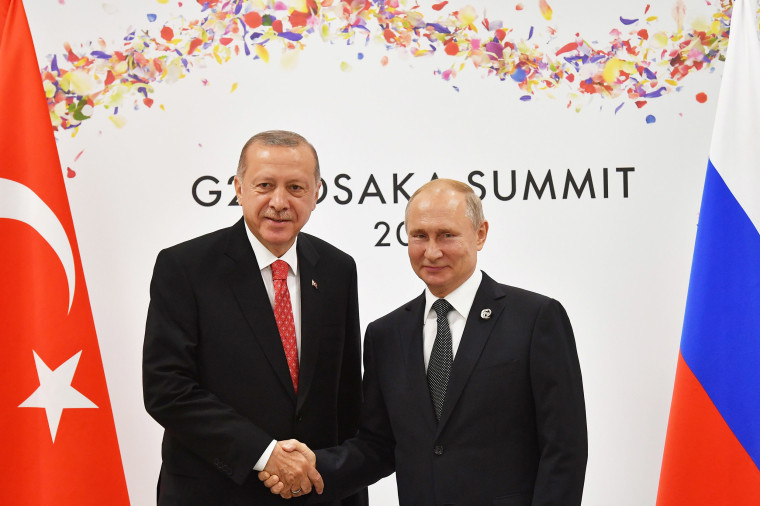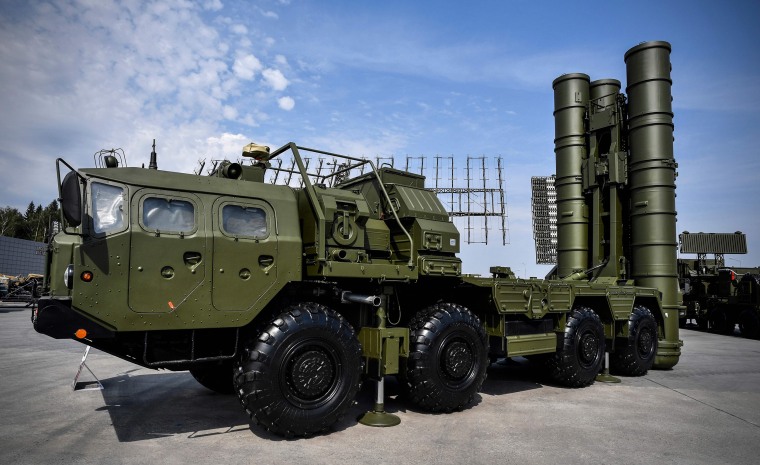Turkey took its first shipment of an advanced Russian missile defense system Friday, ignoring repeated warnings from Washington and fueling concerns about where the country's loyalties lie between the West and Moscow.
Turkey is reportedly paying some $2 billion for Russia's S-400, which is among the most advanced and feared air defense systems in the world.
The "first batch" of components were delivered to the Murted Air Base outside the capital, Ankara, the Russian defense ministry said in a statement, and more parts would be delivered "in the coming days," Turkey's Defense Industry Directorate added.
"The S-400 anti-aircraft missile system is the newest air defense system and is designed to defeat a wide range of modern and prospective air attack weapons," the Russian defense ministry said.
The deal is the first of its kind between a NATO member and Russia, and risks a showdown with the United States.
Turkey has been a NATO member since 1952. It boasts the alliance's largest number of troops after the U.S., with more personnel than France and the United Kingdom combined, according to NATO figures.

Ankara has ordered around 30 of the F-35 stealth fighter jets that Washington hopes will form the alliance's aerial backbone. Turkey has also helped manufacture parts for the jet and its pilots have been running training flights at an air base in Arizona.
However, the U.S. and other industry analysts warn that the S-400 is incompatible with NATO's systems.
More worrying from Washington's perspective is if the Russian missile system and the American jets are deployed on the same soil, the S-400 could learn how to track the stealth F-35 and perhaps even target its vulnerabilities.
In light of this, Washington has already started the process of removing Turkey from the F-35 program, halting the training of Turkish pilots in the U.S.
It has also warned Turkey that if it goes ahead with the purchase, it will face economic sanctions under the Countering America's Adversaries Through Sanctions Act. It is this act — known as CAATSA — that the U.S. deployed when China bought the S-400 and other equipment from Russia's blacklisted state arms export agency.
In February, Vice President Mike Pence said that the U.S. "will not stand idly by while NATO allies purchase weapons from our adversaries."
U.S. officials have encouraged Turkey to buy the Patriot missile defense system instead of the S-400. But Turkey says the offer does not meet its requirements, including possible future joint production.
Turkish President Tayyip Erdogan said after meeting President Donald Trump at the G-20 summit last month that Washington did not plan to impose sanctions on Ankara for buying the S-400s. Trump said Turkey had not been treated fairly but did not rule out sanctions.
The deal has been fueling concerns that Turkey is drifting toward Moscow.
Russia has already built the TurkStream gas pipeline across the Black Sea, an energy artery that will send 31.5 billion cubic meters of gas each year to western Turkey and the Balkans. Russia is also in the midst of constructing Turkey's first nuclear power plant at a cost of $20 billion.
Meanwhile, U.S.-Turkey relations have frayed in Syria, where Ankara opposes Kurdish fighters who are backed by Washington and have been instrumental in the fight against the Islamic State militant group.
Turkey has also been calling for the U.S. to extradite Fethullah Gulen, the exiled cleric currently holed up in a Pennsylvania compound who remains a target of Erdogan.
Alexander Smith reported from London, Elena Holodny reported from Moscow.


